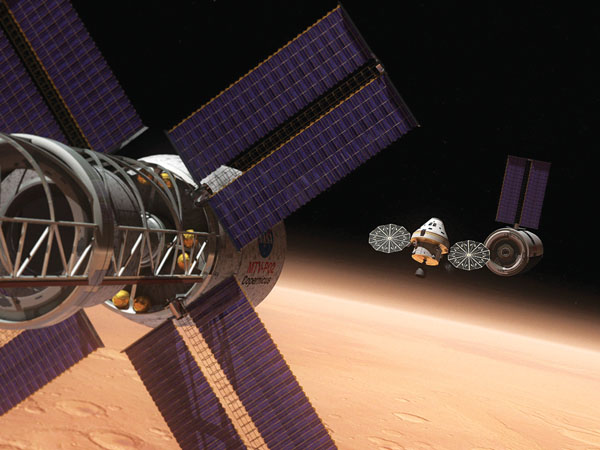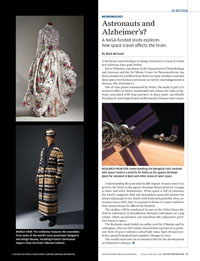In Review
 RESEARCH FRONTIER: Understanding the biological risks involved with space travel is a priority for NASA as the agency develops
plans for missions to Mars and other areas of outer space. (Photo: John Frassanito and Associates/NASA)
RESEARCH FRONTIER: Understanding the biological risks involved with space travel is a priority for NASA as the agency develops
plans for missions to Mars and other areas of outer space. (Photo: John Frassanito and Associates/NASA)A Rochester neurobiologist is taking Alzheimer’s research where few scientists have gone before.
Kerry O’Banion, a professor in the Department of Neurobiology and Anatomy and the Del Monte Center for Neuromedicine, has been awarded $1.8 million from NASA to study whether extended deep space travel places astronauts at risk for neurodegenerative diseases like Alzheimer’s.
One of nine grants announced by NASA, the study is part of a research effort to better understand and reduce the risks to humans associated with long journeys in deep space, specifically focusing on neurological and cardiovascular diseases and cancer.
Understanding the potential health impact of space travel is a priority for NASA as the agency develops future plans for voyages to Mars and other destinations. While space is full of radiation, the Earth’s magnetic field and atmosphere generally protect the planet and people in low Earth orbit from such particles. Once astronauts leave orbit, they’re exposed to forms of cosmic radiation that cannot always be effectively blocked.
The studies will be conducted in part at the NASA Space Radiation Laboratory at Brookhaven National Laboratory on Long Island, where accelerators can reproduce the radioactive particles found in space.
The Rochester study builds on earlier work by O’Banion and his colleagues, who in a 2012 study showed that exposure to a particular form of space radiation called high-mass, high-charged particles caused biological and cognitive changes in mice.
The results indicated an accelerated risk for the development of Alzheimer’s disease.

